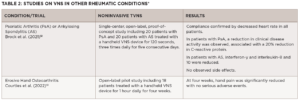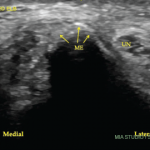The 2020 study by Genovese et al., published in Lancet Rheumatology, is the only trial to date to include a sham arm and, therefore, provides the highest quality of evidence on the safety and efficacy of VNS for RA.1 Noting that the aim of the trial was to assess the safety of implanting the device, which was demonstrated, Dr. Chernoff underscores that the study also showed disease activity was reduced in some of the patients who had failed all available pharmacologic treatments for RA.
Given the results, SetPoint is collaborating with the U.S. Food & Drug Administration in conducting a trial designed to gain approval for VNS for drug-refractory RA. The RESET-RA trial is a multicenter, placebo-controlled, blinded study with a sham arm. It will include 215 patients with refractory RA who will be implanted with the VNS device; the device will initially be activated in half the patients, and assessments of disease activity will be made. At 12 weeks, the device will be activated in all patients and they will be followed for several years to assess short-term and long-term efficacy. All patients in the study previously failed at least one biologic or JAK inhibitor, and all will remain on methotrexate throughout the study.
“If this approach proves effective in patients with drug-refractory RA, it certainly would provide an alternative treatment option for people who have failed successive drugs,” says Dr. Chernoff, noting, however, that he views VNS as complementary to pharmacologic treatments for RA.
“We have to acknowledge that although biologics and targeted synthetic DMARDs [disease-modifying antirheumatic drugs] have been game changers, we have reached a point with all of these drugs that they have significant liabilities,” he says. “We’re trying to provide a viable alternative treatment option.”
Another randomized study currently underway in France will help determine the safety and efficacy of VNS for erosive hand osteoarthritis. The multicenter ESTIVAL trial includes 145 patients with symptomatic and inflammatory disease randomized to an active and sham transcutaneous vagus nerve stimulation (tVNS) treatment group.2 According to the study’s senior investigator, Jeremie Sellam, MD, a rheumatologist at the Saint-Antoine Hospital, Paris, results of the trial are expected later this year.
Looking Forward

Dr. Staats
Peter Staats, MD, chief medical officer, National Spine & Pain Centers, Frederick, Md., whose work has long focused on neuromodulation, underscores the work that lays ahead before VNS becomes a part of rheumatologic care.



